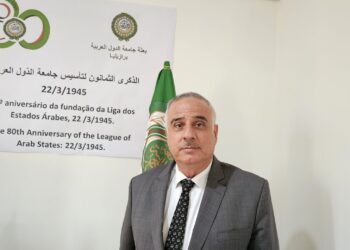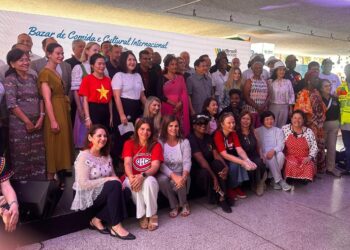
Raquel Pires/ Liz Lobo
Photos: Eliane Loin/ Google


The event was attended by the dean of the Arab diplomatic corps, Ibrahim Zabin, the deputy dean of the African diplomatic corps, Nelson Manuel Cosme, members of the government, ambassadors and representatives of the diplomatic corps.
According to the diplomat, since the Jasmine Revolution of January 14, 2011, where the Tunisians have carried out a series of insurrectionary demonstrations that led to the departure of the president Zine el-Abidine Ben Ali, who held the position since 1987, the Tunisians have been seeking consensus to deal with differences in the management of public affairs. “We decided to establish a progressive constitution in 2014 that would meet the highest international standards and affirm the commitment of the Tunisians to the universal values of human rights and their respect for freedom, justice and equality.”

The country, which will host the 30th regular session of the League of Arab States Summit later this month, and the 18th session of the Francophone Summit in 2020, is increasingly exploring the international arena. “The success of Tunisia on its transition path has brought more respect and recognition in the international arena, exemplified by the awarding of the Nobel Peace Prize by the Tunisian National Dialogue Quartet in 2015,” said the ambassador.

Brazilian support – Mohamed Sotani stated that Brazil was one of the first countries to congratulate and support the emerging democratic experience of Tunisia. According to him, relations between the two countries have had a clear boost, especially after a series of events and visits exchanged between the two countries. These included the visit of the Minister of Foreign Affairs to Brazil in 2017, the visit of the Minister of Foreign Affairs of Brazil to Tunisia in 2018, the organization of the third session of the Joint Committee in April 2017 and the second session of bilateral political consultations in July 2018.

Embaixador Mohamed Hedi Soltani comemorou o 63º aniversário da data nacional daquele país ressaltando as mudanças políticas nos últimos anos e a relação bilateral com o Brasil
Raquel Pires/Liz Lôbo


O evento, na residência oficial da Tunísia, no Lago Sul, teve as presença do Decano do corpo diplomático Árabe, Ibrahim Zabin, o vice-decano do corpo diplomático Africano, Nelson Manuel Cosme, membros do governo, empresários, embaixadores e representantes do corpo diplomático.

Segundo o diplomata, desde a Revolução de Jasmim de 14 de janeiro de 2011, onde os tunisianos realizaram uma série de manifestações insurrecionais que levaram à saída do presidente, Zine el-Abidine Ben Ali, que ocupava o cargo desde 1987, os tunisianos têm procurado manter o consenso para lidar com as diferenças na gestão dos assuntos públicos. “Decidimos estabelecer uma constituição progressista em 2014 que atendesse aos mais altos padrões internacionais e afirmasse o compromisso dos tunisianos com os valores universais dos direitos humanos e seu respeito à liberdade, justiça e igualdade”.
As primeiras eleições primárias e legislativas livres no país ocorreram em 2014 e as primeiras eleições locais em maio de 2018, sendo destacadas pelo embaixador. Sotani também ressaltou foi a relação entre Brasil e Tunísia ao agradecer ao governo brasileiro pelo apoio à candidatura da Tunísia para a adesão ao Conselho de Segurança durante o período 2020 – 2021.

Apoio brasileiro – Mohamed Sotani declarou que o Brasil foi um dos primeiros países a felicitar e apoiar a emergente experiência democrática da Tunísia. Segundo ele, as relações entre os dois países têm tido um claro impulso, especialmente após uma série de eventos e visitas trocadas entre os dois países. Entre elas, a visita do ministro dos Assuntos Estrangeiros ao Brasil em 2017, a do Ministro das Relações Exteriores do Brasil à Tunísia em 2018, a organização da terceira sessão do Comitê Misto, em abril de 2017 e a segunda sessão das consultas políticas de bilateral em julho de 2018.



















